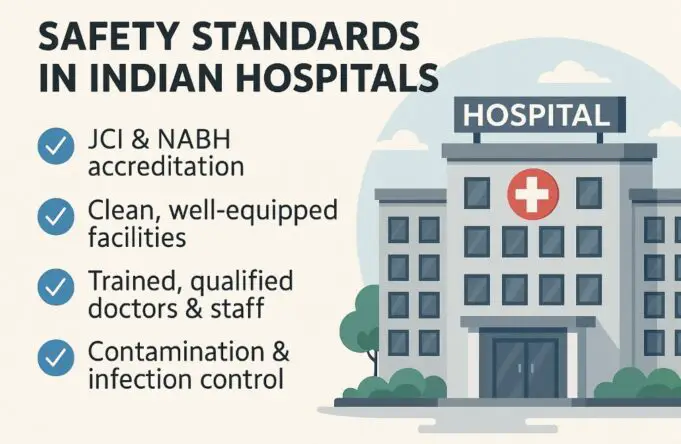Navigating the decision of seeking medical treatment abroad, particularly surgery, can be daunting. For many international patients, especially those from Africa, the Middle East, or Southeast Asia, a primary concern is the safety and trustworthiness of foreign healthcare facilities. While attractive package deals and positive testimonials abound, the fundamental question remains: “Can I trust an Indian hospital with my surgery?” This article aims to address these concerns by exploring the robust safety measures in Indian hospitals and highlighting the significance of global accreditations like JCI and NABH.

Understanding Safety in Indian Healthcare
Medical safety extends far beyond superficial cleanliness. It encompasses a comprehensive approach to patient well-being. In the Indian healthcare context, safety signifies a hospital’s preparedness to deliver care without introducing additional risks. This includes, but is not limited to:
- Emergency Preparedness: Are medical staff adequately trained to manage critical situations and emergencies?
- Sterilization Protocols: Are operating theatres maintained to the highest standards of sterility to prevent infections?
- Informed Consent: Are patients thoroughly informed about their treatment plans, including potential risks and benefits, both before and after procedures?
- Adherence to Protocols: Do doctors and healthcare providers strictly follow international medical guidelines and protocols?
- Medication Safety: Are stringent protocols in place to ensure correct medication administration and prevent errors?
The Gold Standard: JCI Accreditation
Joint Commission International (JCI) is a U.S.-based organization that rigorously evaluates hospitals worldwide. A hospital with JCI accreditation signifies adherence to the same stringent safety and quality standards found in top-tier Western healthcare facilities. For international patients, this accreditation offers significant reassurance. JCI-accredited hospitals are committed to:
- Infection Control: Implementing strict practices to minimize the risk of healthcare-associated infections. This includes meticulous hygiene, proper sterilization of equipment, and isolation protocols.
- Staff Competency: Ensuring that doctors and nurses undergo continuous re-evaluation and professional development to maintain high levels of skill and knowledge. This includes regular training on new procedures, technologies, and patient safety protocols.
- Patient Rights Protection: Upholding and protecting every patient’s rights, including privacy, informed consent, and the right to refuse treatment. This also covers clear communication and grievance redressal mechanisms.
- Emergency Readiness: Maintaining fully equipped and readily available emergency response teams capable of handling various medical crises. This involves regular drills and updated emergency protocols.
- Quality Improvement: Continuously monitoring and improving all aspects of patient care, from admission to discharge and follow-up.
JCI hospitals undergo regular, unannounced inspections to ensure ongoing compliance with these high standards, guaranteeing consistent quality and safety.
NABH: India’s Commitment to Quality
The National Accreditation Board for Hospitals and Healthcare Providers (NABH) is India’s own national accreditation body, establishing robust standards for healthcare quality and patient safety across Indian hospitals. NABH accreditation signifies a hospital’s strong commitment to accountability and patient-centric care. NABH-accredited hospitals are mandated to ensure:
- Comprehensive Hygiene and Patient Safety: Maintaining a clean and safe environment for all patients, encompassing everything from facility cleanliness to equipment safety.
- Qualified and Credentialed Staff: Employing only well-trained, qualified, and credentialed medical professionals, ensuring a high standard of expertise.
- Robust Patient Feedback Systems: Implementing effective mechanisms for collecting and addressing patient feedback, demonstrating a commitment to continuous improvement based on patient experience.
- Ethical Billing and Transparency: Adhering to ethical billing practices and maintaining complete transparency regarding costs, preventing hidden charges and building patient trust.
- Infection Prevention and Medication Safety: Implementing rigorous protocols for infection prevention and control, as well as comprehensive medication safety measures to prevent errors.
Many leading hospitals in India proudly hold both JCI and NABH certifications, offering an unparalleled level of assurance for international patients seeking quality healthcare.
Why Accreditation Matters for International Patients
Accreditation, whether JCI or NABH, serves as a crucial indicator of a hospital’s dedication to quality, safety, and continuous improvement. For international patients, this offers invaluable reassurance and builds trust. Accredited hospitals guarantee:
- Safe Operating Environments: Clean, sterile, and well-equipped operating rooms that adhere to international standards.
- Transparent Billing: Clear and upfront communication about all costs, eliminating unexpected charges and fostering financial trust.
- Supportive Communication: Availability of English-speaking staff and, frequently, interpreters for various languages (e.g., Arabic, French, Russian) to ensure clear communication throughout the treatment journey.
- Emergency Preparedness: Comprehensive emergency backup systems and protocols in place to handle any unforeseen complications.
- Continuity of Care: Plans and support for continued care even after the patient returns to their home country, ensuring a smooth transition and ongoing recovery.
Verifying Accreditation Status
Checking a hospital’s accreditation status is straightforward. Patients can:
- Visit the hospital’s official website: Accreditation logos are typically displayed prominently on the homepage or in the “About Us” section.
- Consult official accreditation websites:
- NABH: www.nabh.co
- JCI: www.jointcommissioninternational.org
- Contact the hospital’s international desk or a medical facilitator: Request direct proof of current accreditation certificates. It’s crucial to ensure that the accreditation certificates are current, as they are renewed every few years.
Leading Accredited Hospitals in India (Sample List):
India boasts a strong network of internationally accredited hospitals renowned for their specialized care. Here’s a sample:
| Hospital | City | Accreditation | Specializations (Illustrative) |
| Apollo Hospitals | Chennai | JCI + NABH | Cardiology, Oncology, Organ Transplants |
| Medanta – The Medicity | Gurgaon | JCI | Cardiac Sciences, Neurosciences, Orthopaedics |
| Fortis Escorts Heart Institute | New Delhi | JCI | Cardiology, Cardiac Surgery |
| Kokilaben Dhirubhai Ambani Hospital | Mumbai | JCI + NABH | Oncology, Neurosciences, Pediatrics |
| Aster Medcity | Kochi | NABH | Multi-specialty, including Organ Transplants |
| Max Super Speciality Hospital | Delhi | NABH | Oncology, Neurosciences, Orthopaedics |
| Gleneagles Global Hospital | Chennai | JCI | Liver Transplants, Cardiac Sciences |
| Manipal Hospitals | Bangalore | NABH | Multi-specialty, including Oncology, Orthopaedics |
Key Considerations for Safe Indian Hospitals
When selecting a hospital for emergency or trauma care, specific factors are paramount:
- Location: In emergencies, every minute counts. Proximity and accessibility of the hospital are crucial.
- Accreditation: Prioritize hospitals accredited by JCI and/or NABH for assured safety standards.
- Emergency Department Capabilities: Investigate the hospital’s emergency department’s infrastructure, staffing, and experience in handling critical cases.
- Trauma Centers: For trauma care, verify if the hospital operates a dedicated and well-equipped trauma center.
- Specialized Care: Ensure the hospital offers specialized care relevant to your specific needs, be it cardiology, neurology, IVF & fertility, or orthopaedics.
India’s Edge in Medical Tourism
Beyond impressive accreditations and modern infrastructure, Indian hospitals distinguish themselves through the exceptional quality of patient care. Healthcare providers in India often go the extra mile to explain conditions comprehensively, walk patients through procedures in detail, and offer reassurance to families. Many facilities provide dedicated international patient coordinators who assist with every aspect, from airport transfers to post-operative recovery planning.
A significant differentiator is cost transparency. Unlike many countries, Indian hospitals frequently offer all-inclusive surgery packages. These packages typically cover:
- Pre-surgery diagnostic tests
- The surgical procedure itself
- Hospital stay duration
- Required medications
- Food and essential post-operative care
This combination of world-class technology, highly skilled English-speaking staff, personalized care, and cost-effectiveness positions India as a highly trusted destination for safe and affordable medical treatment.
Dispelling Common Myths about Hospital Safety in India
Addressing common apprehensions held by international patients:
- Myth 1: Indian hospitals are less clean or modern.
- Truth: Top hospitals in India are equipped with cutting-edge infrastructure, including advanced ICUs, modular operation theatres, and robotic surgery systems. They meet or often exceed global standards in terms of technology and cleanliness.
- Myth 2: Communication will be a barrier.
- Truth: In JCI/NABH-accredited hospitals, English is widely spoken by medical professionals. Furthermore, interpreter services are frequently available for a range of international languages, ensuring seamless communication.
- Myth 3: Low cost implies lower quality.
- Truth: The affordability of medical care in India is primarily due to favorable currency exchange rates and efficient operational models, not compromised quality. Many Indian doctors have received international training and possess decades of experience, making them highly skilled and knowledgeable.

- Truth: The affordability of medical care in India is primarily due to favorable currency exchange rates and efficient operational models, not compromised quality. Many Indian doctors have received international training and possess decades of experience, making them highly skilled and knowledgeable.
Conclusion: Can You Trust Indian Hospitals?
Just like any global healthcare landscape, not all hospitals are uniformly excellent. However, a significant number of Indian hospitals are not only safe but truly exceptional. They effectively integrate global safety protocols with the expertise of highly experienced doctors and deliver personalized care that resonates deeply with patients. The key lies in informed decision-making.
Therefore, prospective patients are encouraged to take their time, ask pertinent questions, and diligently verify accreditations. When these steps are followed, patients can be confident that India is indeed a reliable destination, ready to provide expert care with a welcoming and supportive approach.

